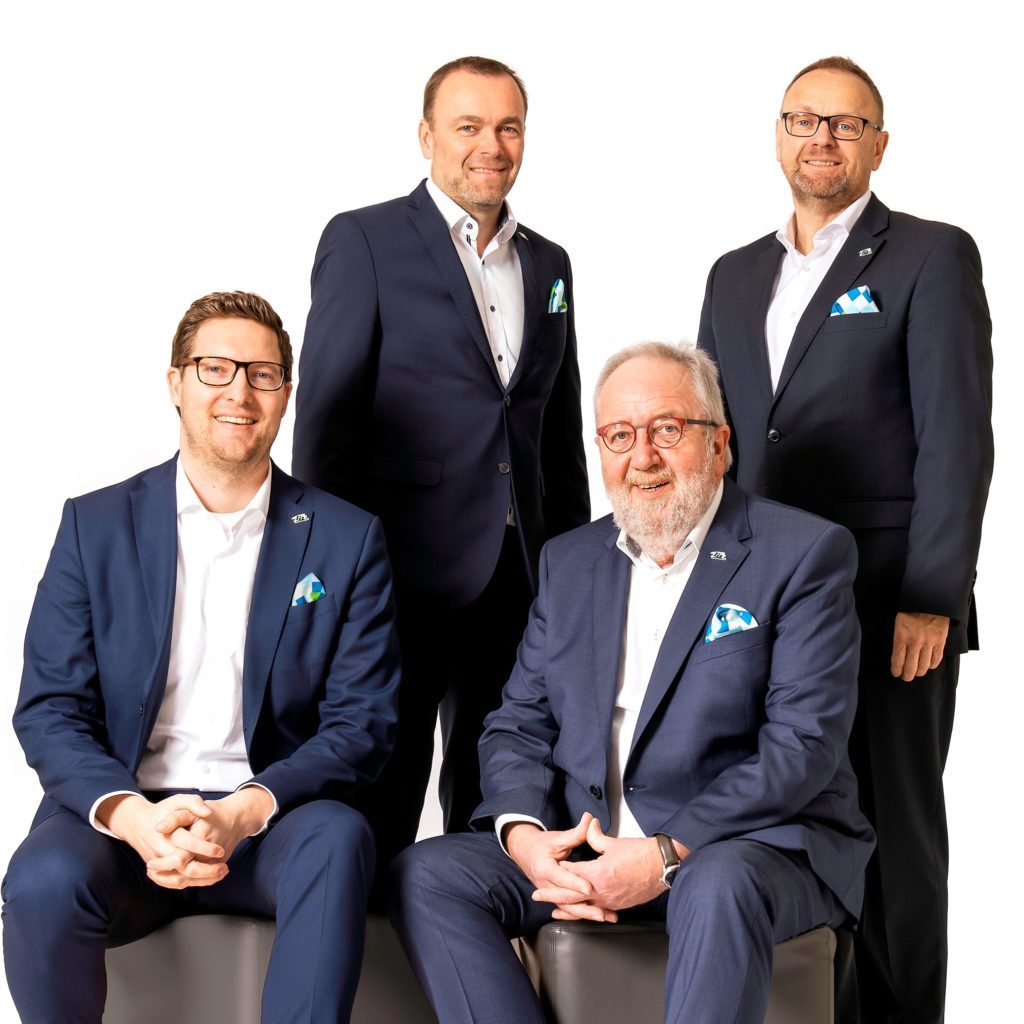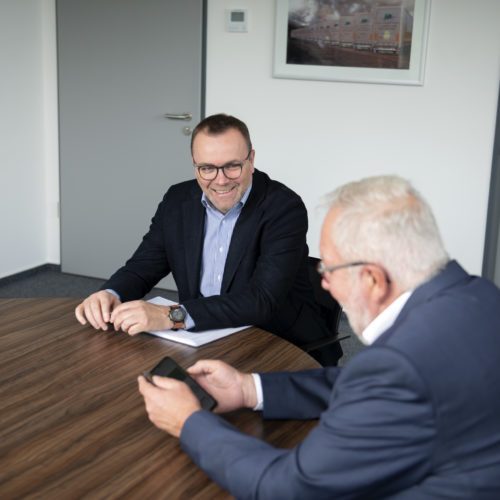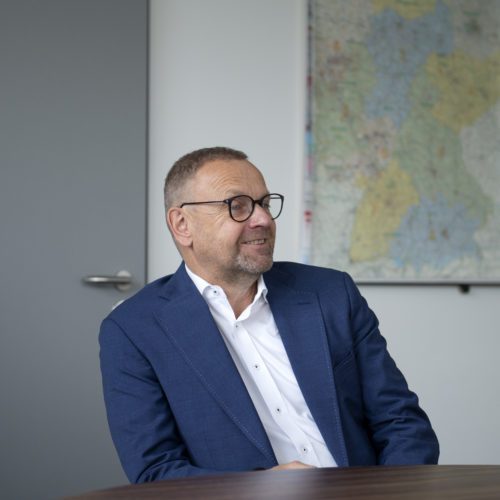Interview with the L.I.T. Management Board: about the challenges and goals of the Group

The year 2022 was marked by crises. L.I.T. is resilient and has set a decisive course. For the current issue of L.I.T.eratur, we asked our Management Board how the Group is meeting the challenges and how important internationalisation is becoming.
Looking back from an entrepreneurial perspective: How was the year 2022?
Fokke Fels: If we take the uncertainties and closures due to the coronavirus pandemic as a comparison, then better than 2021. Although the virus still accompanied us in our daily work, we no longer had to close any of our customers’ plants, for example. That was positive. However, the next crisis, the war in Ukraine, followed in February. Nobody could have imagined that one country in Europe would attack another. But we were taught otherwise – unfortunately. And the war of aggression also has an indirect impact on us.

They allude to inflation, the price of diesel and lockdowns, among other things.
Simeon Breuer: The price of diesel was already rising last year, but Russia’s war of aggression fuelled this development even more. At times we had to pay more than two euros per litre. This is a huge cost factor for our transport business and it took a massive effort from all our employees to work out solutions with our existing customers. Together with them, we have found agreements. We would like to take this opportunity to thank them – without them we would not have been able to cope with this price explosion.
Ingo Schreiber: The driver situation among our Polish colleagues has also deteriorated this year. Almost a third of their truck drivers come from non-EU countries. The majority are people from Ukraine who have been called up since the war and are defending their country. As a result, there is a shortage of more than 100.000 drivers – exacerbating the already severe shortage of skilled labour.
In addition, there are delivery problems with towing and towed equipment, where we wait up to a year after ordering and the availability of spare parts for repairs has become more difficult.
Air & Sea has developed positively, what innovations are there in this area, Mr Breuer?
Breuer: For example, we have developed a rail connection via the “Iron Silk Road” to and from China with our L.I.T. Air & Sea GmbH in Hamburg. The transports may take slightly longer, but they are more reliable. Air & Sea is a real highlight and a truly successful model for us. Following our expansion to Barcelona in 2020, we opened two new locations in Hamburg this year in order to handle air and sea freight shipments from there in a more targeted manner. The company’s development in recent years has been more than pleasing. We are ideally positioned for the future.
Despite the crises you have already mentioned, L.I.T. is growing again this year. Why are you so crisis-proof?
Julian Lachnitt: We are resilient. For years, we have positioned our company broadly so as not to be dependent on one sector or service. This large portfolio prevents us from getting into difficulties in the event of crises, such as a lack of semiconductors and cable harnesses, failed shifts or shortages of raw materials.
Internationalisation now plays an even more importantrole for L.I.T. As an example, international customers such as Miss Mary of Sweden and Palfinger AG have been acquired as projects.
Fels: Our international orientation and our size help us with such exciting projects – definitely. Both companies – Miss Mary from Estonia and Palfinger from Austria – were looking for a suitable and customised logistics solution for the German and international market. We were able to convince them with our concepts and are delighted with both projects.
Breuer: However, we don’t just realise comprehensive logistics solutions for international customers in Germany. We have a total of 101 locations in 14 European countries and realise logistics concepts. This year we founded our new L.I.T. Cargo CZ Sro. in the Czech Republic. We see this as an opportunity to create new resources and capacities in the vehicle fleet for even greater efficiency in the haulage business.

Schreiber: And, above all, to improve the situation in terms of driver availability. We previously also used external partners and are now increasingly doing this with our own drivers. In the middle of the year, the first trucks with L.I.T. flags and Czech licence plates left the yard. Overall, we are very satisfied with the start.
What is the reason for internationalisation?
Breuer: We want to offer our customers comprehensive transport services in Europe. We will therefore be opening a location in Lithuania in the coming year and expanding the product portfolio of L.I.T. Air & Sea in Barcelona to include overland transport. Both were previously “blank spots” on our map of Europe, which we are now gradually closing in order to offer our customers exactly the logistics concept they need.
Are there any other “white spots” in Europe?
Breuer: When we think about international expansion, we are primarily focussing on countries such as Slovakia. We are already represented in core Eastern Europe, but countries such as Hungary and Slovakia are very interesting markets. They are up-and-coming nations.
But you have also invested in existing international locations. The workforce in the Netherlands was given a new office this year. In Zielona Góra, Poland, the company invested in a new, innovative building three years ago.
Lachnitt: The new locations in the Netherlands and Poland are clearly linked to our growth. Both companies had reached the limits of their capacity, so we had to and wanted to react. Administratively, we keep the processes lean to ensure scalability. If these locations develop even better, for example, we can react quickly.
Breuer: That’s how we feel about L.I.T. Ceska republika s.r.o. That also makes us resilient, to take us back to the beginning. Building blocks like these enable us to distribute our business even better and position ourselves in a crisis-proof manner.
“Building blocks” is a good keyword: despite the crises, you have incorporated two new companies into the Group this year.
Schreiber: Correct, but a distinction must be made between the two projects. In combination with WESTFALIA intralog GmbH, the takeover of Würfel Spedition GmbH was a logical step. This will enable us to achieve even greater market penetration, as Würfel and WESTFALIA serve the same business. Thanks to the takeover, we now have over 4,500 swap bodies, making us a big player in this field. DanWith the takeover of Fehrenkötter Transport & Logistik from Ladbergen, we have integrated a new component into our organisation. Now we can offer something that we couldn’t before. In addition to transporting agricultural machinery, we are the first transport service provider to offer vehicle manufacturers both inbound and outbound logistics from a single source.
Fels: We are also focussing even more on contract logistics and want to position ourselves on the market. Projects such as those with Miss Mary of Sweden and Palfinger AG, which optimally contribute to our goals. We have also founded Automotive Solutions GmbH, with which we offer and successfully implement logistics solutions for OEMs.
What is your outlook for the coming year?
Fels: I am optimistic about the next few years because we have done our homework. With the founding of L.I.T. Solutions GmbH with Klaas Lange as Managing Director, we have once again professionalised our project management and positioned ourselves perfectly for the future. This is a real milestone. Of course, driver availability will remain a major issue that we will continue to address as the L.I.T. Group. We want to continue to be a secure employer for our colleagues and offer an attractive workplace. We have been doing this successfully for many years and I notice that we work together in a spirit of trust and co-operation. In line with our company motto “Together for success”, we want to meet the impending challenges in the coming year and successfully master our projects.
© 2025 L.I.T. AG · Otto-Hahn-Straße 18 · 26919 Brake Data protection | Imprint | Gender regulation | Manage consent | Complaint form | AGB
© 2025 L.I.T. AG · Otto-Hahn-Straße 18 · 26919 Brake
Data protection | Imprint | Gender regulation | Manage consent | Complaint form | AGB
© 2025 L.I.T. AG
Otto-Hahn-Straße 18 · 26919 Brake
Data protection | Imprint
Gender regulation | Manage consent
Complaint form | AGB